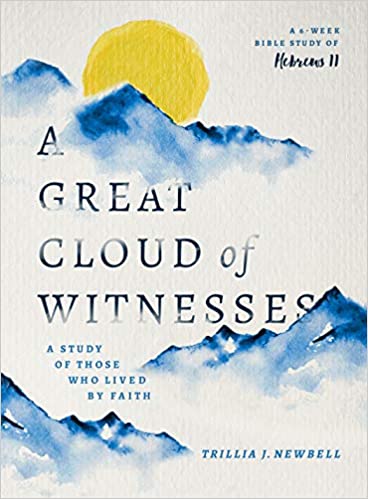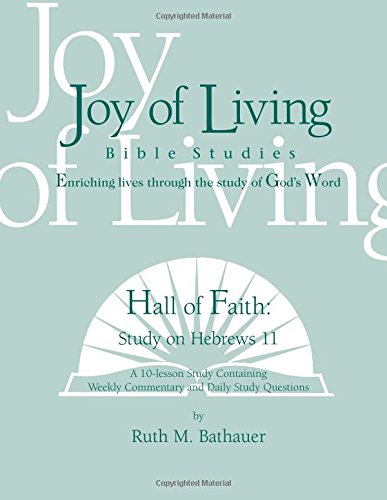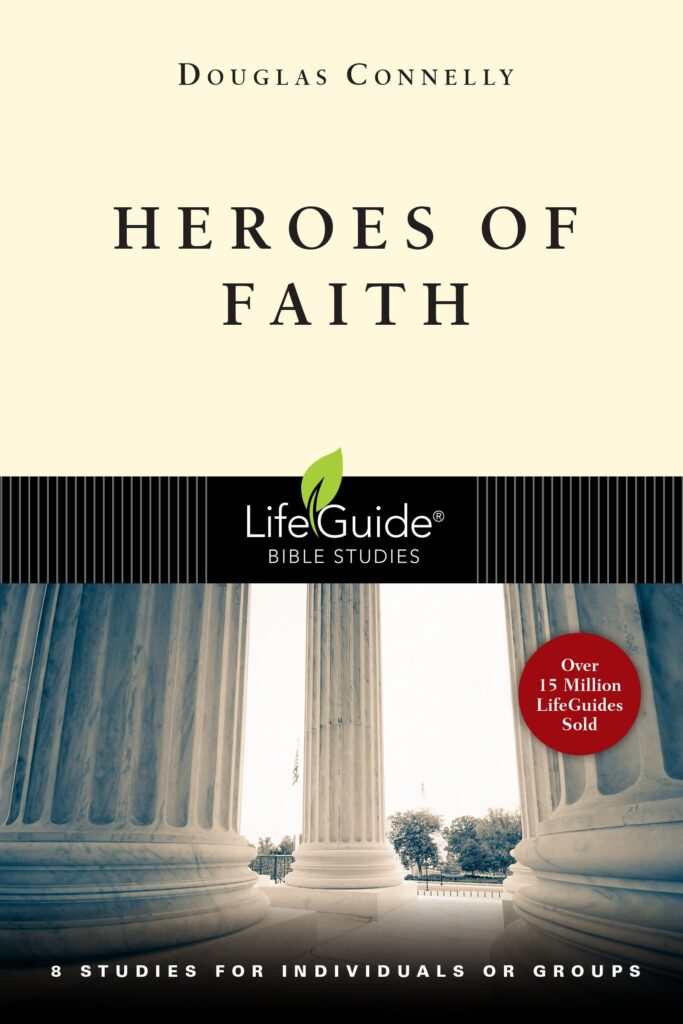Click here to return to Blog Post Intro
A Great Cloud of Witnesses: A Study of Those Who Lived by Faith by Trillia Newbell

Here’s a quick review of Moses’ life, as described in Hebrews 11:23-28 –
- At his birth, the Egyptian Pharaoh ordered midwives to kill any son born to a Hebrew woman, but the midwives feared God and didn’t comply.
- The Pharaoh then ordered his people to cast the male babies into the Nile River (Exodus 1:15-17, 22).
- Moses’ mom hid him from Pharaoh, so he wouldn’t be killed. Ultimately, Moses’ mother and sister hid him in a basket on the riverbank of the Nile.
- Pharaoh’s daughter found him and after being approached by Moses’ sister, agreed that his sister could find a nurse for the child.
- That meant Moses’ mother was paid to nurse her son (Exodus 2:3-9).
- Moses grew up as son to Pharaoh’s daughter in a life of privilege—not subject to the slavery of his Hebrew people-.
- As Moses grew, so did his burden for the Hebrew people.
- At one point, Moses even killed an Egyptian to protect a Hebrew who was being beaten by the man. When Pharaoh learned of this, Moses fled (Exodus 2:11-15).
What a beginning to life!
But consider this: Moses denied his adopted status and material possessions—those were fleeting pleasures—and instead chose to be mistreated (Hebrews 11:25). His faith was great because of what he did in adversity for the cause of the Lord (Hebrews 11:26).
Unlikely Heroes: Ordinary People with Extraordinary Faith by Daniel Lockwood

The Power of a Simple Choice
Choices—even small ones—can have huge consequences.
Moses’ parents—Amram & Jochebed—made a significant courageous choice. Knowing their baby is to be killed, they hide him as long as possible then release him with the hope that somehow, someway he would survive.
God’s providential hand protects Moses from early death, guides his floating cradle into the royal palace, and sets him on what seems to be a course of political greatness. Eighty years later, Moses faces down the mighty Pharaoh, leads his people on the exodus from Egyptian slavery, and becomes known as Israel’s great Lawgiver who speaks with God.
But Moses wasn’t perfect. His youthful brashness leads him to commit murder. Consequently, he is shunned by the very people he longs to deliver, forced into a lonely, forty-year exile. Then, he marries a Gentile woman and later suffers grief from his own siblings for his interracial marriage (Numbers 12:1). Then, Moses ultimately forfeits, through his own disobedience to God, his lifelong goal of entering the Promised Land.
Here are five life-changing choices of faith described in Hebrews 11:
| Unlikely Heroes | Description | Choice Focus | Reward |
| Moses’ Parents (Heb. 11:23) | A New Authority | To obey God over Pharaoh | A New Leader |
| Moses (Heb. 11:24-26) | A New Allegiance | To share mistreatment with God’s people | A New Community |
| Moses (Heb. 11:27) | A New Assignment | To accept the Sinai wilderness over slavery | A Theophany |
| Moses (Heb. 11:28) | A New Atonement | To keep the Passover with its sprinkled blood | Exodus from Egypt |
| The People (Heb. 11:29) | A New Adventure | To pass through the Red Sea | The Promised Land |
Let’s consider our own applications:
- A New Authority: Obey God rather than man, doing so in ways that honor our leaders even if we must follow God’s Word.
- A New Allegiance: Live in community with other believers, a richness far beyond temporal position, pleasure, or possessions.
- A New Assignment: Our unique calling may require following God’s training regimen with its particular timetable.
- A New Atonement: Proclaim and live out God’s redemptive message of grace in a world that often defaults to legalism.
- A New Adventure: Embrace the life of faith, not as dull duty, but as a divine adventure.
Joy of Living Bible Studies – Hall of Faith: Study on Hebrews 11 by Ruth M. Bathauer

When man attempts to change history, he usually uses battles or ballots, but when God changes history, He begins with a baby. God changed the course of history for Israel long before the birth of Jesus Christ by sending a baby boy into the home of two of His devout followers. The baby’s name was Moses.
When Moses reached maturity, he made specific choices by faith. He had been well educated in the wisdom of Egypt but his faith no doubt was embedded in his heart and mind by the training he received from his godly birth parents.
What a challenge the faith of Moses can be for us today. He, by faith, made a choice for an all-out identification with the Lord despite the cost to his personal life.

Moses—like Abraham, Sarah, Isaac, and Jacob before him—heard God’s call and followed Him in faith, but he still managed to stumble and fall when he tried to do God’s work by his own human plan and strength.

Hebrews 11:1 was demonstrated at the Red Sea. It was the faith of the leaders and the people who attempted the impossible at God’s command. The greatest barrier is no problem to God if there is a belief that God is there to guide each step of the way. Hebrews 11:27 says that Moses had faith and was able to render strong leadership “because he saw [God] who is invisible.”
Heroes of Faith by Douglas Connelly

Resting on a Trustworthy God
Even though Moses was raised in Pharaoh’s household and had a title of prominence in Egypt, he made two key decisions to identify himself with the people of God:
- A deliberate choice to turn away from the path of power and influence.
- A decision to be mistreated in the company of God’s people rather than be treated well in the halls of political and economic power.
He said no to one path and yes to a more difficult path in choosing to align himself with the Hebrew people. As a result, God used Moses to deliver the people of Israel from the oppression of slavery, and that work of liberation was an act of faith from beginning to end.
At each critical step in the deliverance of his people, Moses put his trust in the God who will not fail. We should learn from his example and seek to live a life marked by faith, no matter where we are in the process of deliverance—stuck, leaving, waiting, or set free.
Faith for Life: Inspiration from the Ordinary Heroes of Hebrews 11 by Richard Coekin

Self-Denying Faith
Faith in Christ will always be costly. It’s costly in terms of leaving sinful pleasures behind; and it’s costly in terms of the hostility we’re likely to face. Jesus talked about the cost of Christian faith in Mark 8 –

(a) Deny themselves
This means neglecting our own needs for the sake of others. Jesus wasn’t a masochist, who went to the cross because he likes pain, but a Savior, who went to the cross because it was the only way to save sinners. Like Jesus, we can enjoy the blessings our Father provides, but we will make costly sacrifices for the salvation of sinners. To “deny yourself” means putting others before yourself, especially for their salvation.
(b) Take up their cross
This means accepting suffering for the salvation of others. Notice that Jesus said “take up”, meaning “pick it up”! He will not force us to do so. He calls us to voluntarily accept suffering for the salvation of others.
“Our cross” will be the cost of contributing what we can, as the people we are, towards the mission of making disciples of all nations for Him.
(c) Follow me
This means learning from Jesus how to live by faith in a life of evangelistic holiness for our Father. In Mark 8, Jesus commends the long-term wisdom of this lifestyle with some simple commercially-derived principles:
- Savings (v. 35): “For whoever wants to save their life will lose it, but whoever loses their life for me and for the gospel will save it.”
- Investments (v. 36): “What good is it for someone to gain the whole world, yet forfeit their soul?” There is no point in investing our money if we have nothing invested in our relationship with God. Better to invest in supporting God’s mission now if we want to live with him then.
- Currency (v. 37): “What can anyone give in exchange for their soul?” If the currency that works in heaven is not success and popularity but self-sacrificially following Jesus, then follow him.
- Loyalty (v. 38): “If anyone is ashamed of me and my words in this adulterous and sinful generation, the Son of Man will be ashamed of them when he comes in his Father’s glory with the holy angels.” If we’ve been loyal to him and his gospel—believing, proclaiming, and contending for Christ and his teaching, even if it is politically incorrect—he’ll be loyal to us.
This way of the cross—that Jesus calls us to follow—is a life of self-denial, modeled after the life of Moses, who surrendered his life of luxury as a prince of Egypt to live by faith among God’s suffering people.
Faith empowers us, as it did Moses, to leave the pleasures and treasures of this world behind to patiently wait on the rewards of heaven. God can empower us all to live by the self-denying faith of the former prince of Egypt.
God’s Hall of Faith Speaks Today (Hebrews 11) by J. David Eshleman

Learning to Look Ahead—Overcoming Fear
When the Pharaoh ordered his midwives to kill all the Israelite baby boys, Moses’ parents courageously defied the order. We need to say “No” to anyone who asks us to disobey God’s will. Do you teach your children by word and example to be truthful even though others will make fun of them? Israel’s leaders repeatedly told the people to pass on to the next generation of commands of the Lord to revere and obey his word (Psalm 78:1-8; Deuteronomy 6:1-9). Your greatest mission field is your family.
When God called Moses to deliver his people, Moses was described as “a very humble man, more humble than anyone else on the face of the earth” (Numbers 12:3). In Exodus 4:10-14, Moses begged God to send someone else. Many Christians grieve God’s Holy Spirit because they are unwilling to do what they know they should do (Ephesians 4:30). Don’t deny God’s call by labeling your reaction as humility. This cuts the joy and power God wants to give you.
God empowered Moses. As we tune into God’s Spirit, he not only impresses on our mind what he wants us to do, but he often accomplishes his request with signs such as perfect timing so we realize the encounter was not pure coincidence. When we obey God, the supernatural becomes natural.
Moses persevered by repeatedly going to challenge Pharaoh and then to his own people promising God would deliver them. But their deliverance was not immediate. We want immediate deliverance, but God will give us patience. God’s timing is his tool to develop our faith. As Job said, “Though he slay me, yet will I trust him” (Job 13:15).
Moses “regarded disgrace for the sake of Christ as of greater value than the treasures of Egypt because he was looking ahead to his reward” (Hebrews 11:26). His secret was—looking ahead. He had faith and hope in the future.
Moses looked ahead. Where is your focus?
